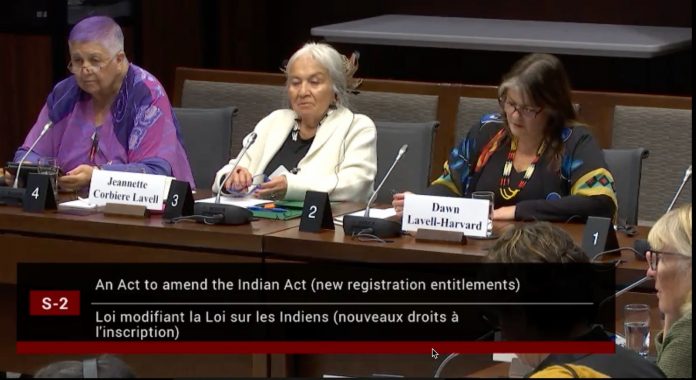Story by Eva Ritchie and Juan Esteban Suarez Castrillón
Sharon McIvor has fought for changes to the Indian Act for years.
On Tuesday, the member of the Lower Nicola Band in B.C. was at it again. This time, she was one of three women appearing before the Standing Senate Committee on Indigenous Peoples.
“We’ve done a lot of talking, lobbying, and even begging over the years,” said McIvor, who estimates she has worked with about 18 federal ministers in charge of this file over her career in advocacy.
McIvor was the plaintiff in McIvor v. Canada (2009), which restored and provided status to women who had lost their rights after marrying non-status men. She is also a member of the Indian Act Sex Discrimination Working Group.
She was joined at the hearings by Jeannette Corbiere Lavell, citizenship commissioner of the Anishinabek Nation and her daughter Dr. Dawn Lavell-Harvard, director of the First Peoples House of Learning at Trent University. Both are from the Wiikwemkoong First Nation on Manitoulin Island.
Bill S-2, An Act to amend the Indian Act, has reignited longstanding debates over gender discrimination, reparations and the broader context of the Act.
The bill aims to remove remaining discrimination within the registration system and modernize outdated provisions of the Indian Act.
Bill S-2, sponsored by a minister from the Cree First Nation and an Innu senator from Quebec, builds on earlier reform efforts, including Bill S-3 and Bill C-38, which did not receive Royal Assent before the last parliament was dissolved.
The Indian Act, first enacted in 1876, remains one of the most controversial pieces of legislation in Canadian history. Among many things, it defines who is legally recognized as a “status Indian,” which continues to cause harm to some Indigenous people, especially women.
Advocates such as Jeannette Corbiere Lavell and Mary Two-Axe Earley were among the first to challenge the Act’s gender discrimination.
Corbiere Lavell’s 1973 Supreme Court case brought national attention to the issue, though the courts ruled against her. Her efforts led to reforms through Bill C-31 (1985), which restored status to many women and their descendants.
Despite those changes, the second-generation cut-off rule (SGC) continues to limit eligibility for grandchildren of mixed-status families.
At the committee hearing, Lavell-Harvard argued one reason the federal government may be acting as it does is to reduce the number of legally recognized First Nations people, leaving their lands unclaimed and, ultimately, returning them to Crown control.
This approach, she said, is rooted in colonial control over the land and resources beneath it — land that now represents just 0.2 per cent of the original territory of Indigenous peoples.
Lavell-Harvard told the committee the amendments to the Act are necessary to give all Indigenous youth a sense of belonging, while also restoring the rights and supports guaranteed to other Indigenous children and families who do have status.
She highlighted the impact on the identity and mental health of First Nations youth, who face higher suicide rates than non-Indigenous youth.
At Tuesday’s hearing, she reminded senators nothing in the law prevents the necessary amendments from being made.
“The Senate is supposed to be that sober second thought on all of this legislation,” she said. “So we can always do better.”
She then urged senators to end the second-generation cutoff to “show that we care about all of our children, because all lives matter and every life is precious.”
Her mother, Corbiere Lavell, had a question for the committee.
“Senators, why after 54 years, are we still introducing these piecemeal amendments instead of dealing with the core issue and eliminating the second-generation cut-off?” she asked.
In the hearing’s second panel of the day, Dene national chief and AFN regional chief for the Northwest Territories, George Mackenzie, supported the legislation, calling it a “significant step” toward reconciliation.
He said the bill would restore registration rights, allow voluntary de-registration and update language in the Act.
Tuesday’s testimony will be included in a draft report. The senators could also propose amendments. The bill will return to the Senate for third reading and, if passed, move to the House of Commons for debate.




